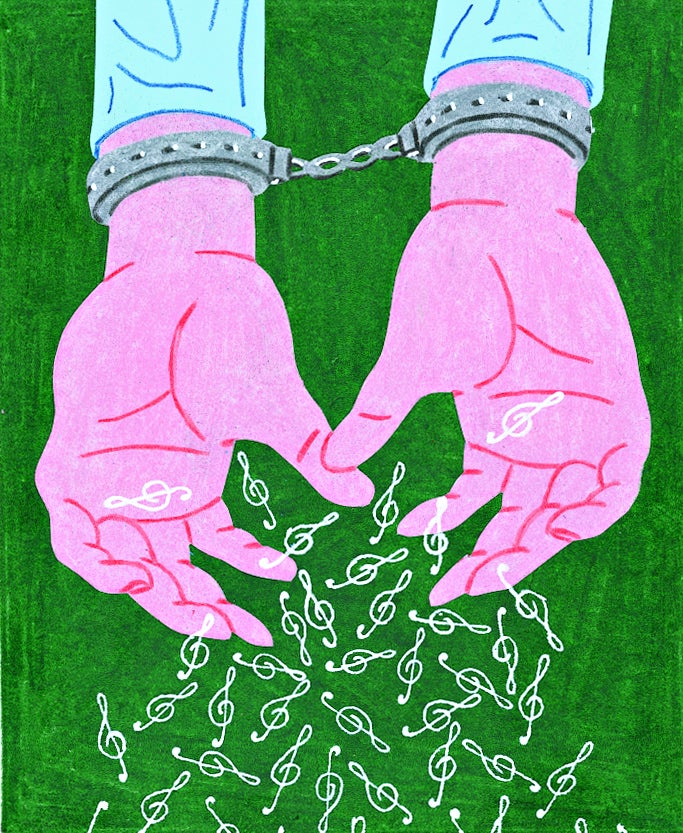Berkman Conference explores solutions to music industry’s greatest peril
Imagine a world without copyrights on songs or movies. Instead, government tax revenue would compensate entertainers in proportion to how much consumers listened to or watched their products.
That was one of five potential scenarios that legal, media and technology experts were asked to consider during a September symposium, sponsored by the Berkman Center for Internet & Society, which explored the impact of new technologies on the music industry.
The gathering couldn’t have been timelier: It took place just 10 days after the Recording Industry Association of America sued 261 consumers who allegedly downloaded and shared music files illegally.
For an entire day, HLS faculty exchanged ideas with a diverse panel including representatives from Microsoft and Intel; the Electronic Frontier Foundation, a San Francisco-based advocacy group; and several universities and research firms. Together they grappled with whether it is possible to strengthen copyright protection through new technologies or different laws–or whether to replace the current copyright regime entirely.
The challenge of protecting intellectual property is as old as our capacity to copy the written word easily, Professor Charles Nesson ’63 said in his opening remarks. Still, he pointed out, the transition from monks copying Bibles to the printing press didn’t generate the same “adolescent fervor” as today’s “era of magnificent, easy digital copies.”
“It’s as if the plate glass windows of the record store are smashed and in we can go,” Nesson said. “We’re now facing the question whether the riot is getting old.”
The statistics presented were familiar: four years of declining record sales as the number of downloaders has skyrocketed. Today, as many as a third of people 30 and over–and more than half of 18- to 29-year-olds–download music. According to University of Texas economics Professor Stan Liebowitz, file sharing has cut industry revenues by about 25 percent.
Still, few hands went up when presenters asked if anyone in attendance was sympathetic to the music industry’s plight. But speakers made clear that it’s only a matter of time before movies–or even books–are swapped online as easily as music.
Panelists agreed that the existing state of affairs can’t continue. According to Mike McGuire, research director of the Gartner|G2 Media firm, which co-sponsored the symposium, without any changes, enforcement efforts are unlikely to curb widespread file sharing among consumers who believe they stand little chance of being caught while using increasingly sophisticated peer-to-peer technology.
Picking among the different scenarios presented by Berkman Executive Director John Palfrey ’01 proved difficult. One option would be the use of technology to prevent CDs and DVDs from being copied, although technological solutions haven’t worked well thus far.
A stricter legal regimen would equate copyrights with property rights, so that those who download music would be prosecuted like those who steal real property. Musician John Perry Barlow, a lyricist for the Grateful Dead and co-founder of the Electronic Frontier Foundation, called that idea “a philosophical distortion” of intellectual property.
The most radical solution proposed: create an entirely new model of compensation based on compulsory licensing–the tax scheme.
William Fisher III ’82, Berkman faculty co-director, laid out the basics of this compulsory licensing proposal, which he also details in his forthcoming book, “Technology, Law, and the Future of Entertainment.” Artists would register their content with the U.S. Copyright Office and obtain a unique file name that would be used to track transmissions of their work on the Internet. The government would tax devices used to play creative content and online services such as Internet service providers.
Other participants didn’t take long to point out potential drawbacks of the tax approach, such as the difficulty of accurately measuring interest in any given song or movie or the unlikelihood that other countries will move to a similar model. A voluntary system, in which artists and consumers agree to participate without government involvement, would be more attractive, Fisher conceded, but far more difficult to administer.
